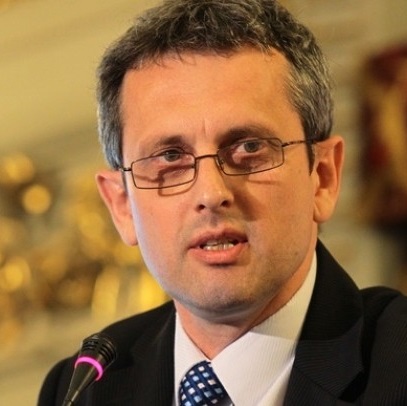 This article was written on April 15 and has appeared in the May 2020 issue of the publication “Cronicile Curs de Guvernare”. As such, it does not reflect the recent Franco-German initiative, of May 2020, which goes some way in the direction suggested by this article.
This article was written on April 15 and has appeared in the May 2020 issue of the publication “Cronicile Curs de Guvernare”. As such, it does not reflect the recent Franco-German initiative, of May 2020, which goes some way in the direction suggested by this article.
*
The discussions of April 2020 between the Finance Ministers have outlined – once again – the lack of solidarity displayed by European states when faced with a crisis. Whether it is about Crimea’s invasion by Russia, the Middle East refugees crisis, global warming or the Covid 19 pandemic, Europe reacts slowly and with insufficient measures, snatched in extremis after endless negociations. This state of affairs should please no taxpayer, but it is sustained and amplified by the existance of self-imposed red lines, as we will try to ilustrate.
The economic aid package recently agreed upon was presented as a big success. In reality, it is not more than a figue leaf destined to cover the impotence of European leaders in finding a common denominator (other than the lowest one). The package includes three elements:
- 240 billion Euro ( potentially reaching 400 billion Euro) as precautionary credit lines, without attached conditionalities, for health expenditures up to the limit of 2 % of GDP for each member state, coming from ESM (the European Stability Mechanism). The operational words are “credit” (these monies will have to be reimbursed) and “no conditionalities” (perverting ESM’s role, which was supposed to act as an European IMF, lending money on the condition of reform);
- 200 billion Euro leveraged from the market, using a 25 billion Euro guarantee issued by the European Investment Bank, dedicated to keeping operating the SMEs;
- 100 billion Euro from the reserve funds of the European Commission, for paying furloughs within the SURE ( Support to mitigate Unemployment Risks in an Emergency) program.
However, the whole package dimension, of 0.54 trillion Euro, pales in comparison to what is expected from the European Central Bank, which is supposed to buy assets worth 1.1 trillion Euro. This leaves yet again the Central Bank in the position of a quasi-fiscal agent, exposed to risks as long as the European Union cannot define a common fiscal policy. The cause for this is represented by national egoisms, which are self-imposing red lines not to be breached under any circumstances.
Red lines of the indisciplined states of Soutern Europe
These states, such as Italy or Spain, would like to receive aid under the form of grants, or – in the worth case scenario – as credit lines with no conditionalities attached. As Prime Minister Giuseppe Conte was saying, such conditionalities would be unacceptable to the Italian people and would represent an undeserved stygma in a situation generated by an external factor ( a pandemic). However, if one is to judge the situation cool-headed, it will appear that:
- externally imposed conditionalities should be accepted (indeed, desired) by weak states that otherwise are unable to generate the internal political will needed fot thorough reforms;
- even though the pandemic is an exogenous factor, the different fiscal position of states at its beginning is a result of the (lack of) reforms undertaken during decades, something Southern states have little to boast about;
- such conditionalities are rightfully requested by donors, fiscally conservative countries, as a proof that their help will not be waisted while leaving things unchanged.
Far from representing a stygma, preferential credit lines, with attached conditionalities, issued by the ESM as an European IMF, should constitute the norm in order to foster European solidarity and a pre-condition for fiscal federalism. Absent these conditionalities, one can forgive the mistrust and the ensuing lack of intra-European fiscal transfers on a large scale.
Incidentally, another wish – albeit not a red line – of fiscally indisciplined Southern states was the relaxation of the Stability and Growth Pact, eagerly followed also by indisciplined states from the East, such as Romania. One should however remember that such a measure was accepted temporarily, until the crisis ends, and asimetrically, to be used by states which have fiscal space. Witness the different size of fiscal impulses: 4% of GDP in Germany, but only less than 1% of GDP in Italy or Spain. And so it should be: the way towards European fiscal federalism requires more, not less discipline, therefore the Stability and Growth Pact should be strenghtened, not diluted.
As for the threat that if the unconditional aid will not be forthcoming, the Italian people might bring to power anti-European forces, we have heard something similar in Greece, with Tsipras’ rhetoric that he would take Greece out of the Eurozone if the Hellenic sovereignity were breached, only to backtrack the moment he starred into the abyss such a measure would have thrown his country into.
Red lines of the disciplined states of Northern Europe
The frugal Northern states are fiercefully opposing any increase in the EU multi-annual budget, because they don’t want to contribute more to the common money box. This is an equally absurd red line, because an impartial analysis reveals that:
- the new challenges of the last years were more efficiently tackled collectively rather than individually by each state. No state, however disciplined, can cope by itself with the whole spectrum of threats. For instance, ultra-pacifist Germany should be paying other states (France, Spain) which are willing to send troops in its stead. The Netherlands, flood-prone due to global warming, should pay states like Poland or Romania for reducing carbon pollution. Austria, laying on the route of migrants from Asia or Africa, should pay Italy or Greece for the long-term shelter they offer these migrants. And so on, and so forth.
- Incresing the Community budget (from 1% of GDP to 3 – 4% of GDP) need not result from an increase in the net contribution of donor states. An arrangement can be found whereby both revenues and expenditures provided by/to any state could increase pari passu. For instance, if it is found that fighting global warming is better done at the Communitary level, both revenues and expenditures devoted currently to this item in the national budgets could be transferred to the EU multi-annual budget.
Red lines of all the states
There is a red line that for the time being no European state wants to breach and it refers to absolute fiscal sovereignity, i.e. the willingness to establish the level of taxes unhindered by the levels in other states. At least the major taxes (on income, on profit, VAT, Social Contributions) should be harmonized, if not unified, within narrow limits. For some Eastern states, such as Romania, this would amount, in the short term, to a loss of attractiveness ( because what is Romania attractive for, other than low taxes and cheao labor?). But in the long run such a harmonization should be beneficial to Romania as well, because it would make mandatory the search for other sources of attractineness (infrastructure, education, R&D). Of course, less important taxes (on wealth, royalties etc.) could remain at state level, as it happens in the USA. The main idea is that European solidarity should not be undermined by suspitions of fiscal dumping, not always unfounded.
But the real red line, which will represent also the maturity test for the European political class, lies in the impossibility of vetoing national budgets by Communitary bodies (the European Commission, the European Parliament) even when they contradict mutually established rules. For such a veto to become possible, national Governments will have to accept a transfer of fiscal sovereignity from the states to the Commission. Moreover, state level decision-makers will have to accept the replacement of the current inter-governmental method of taking decisions (in which heads of states and of governments have the final say, always eyeing the reaction of their own electorates) with the intra-communitary method, in which the final say belongs to the European Commission.
In other words, when a dispute arises between, say, the government heads of Germany, The Netherlands, Italy, and Spain, there should exist a higher instance (The President of the European Commission), who would adjudicate the dispute with a view to the general interest, not to those of national constituencies. Only thus the quote attributed to an American State Secretary (“Whom do I call when I want to speak with Europe?”) would receive a clear answer.








